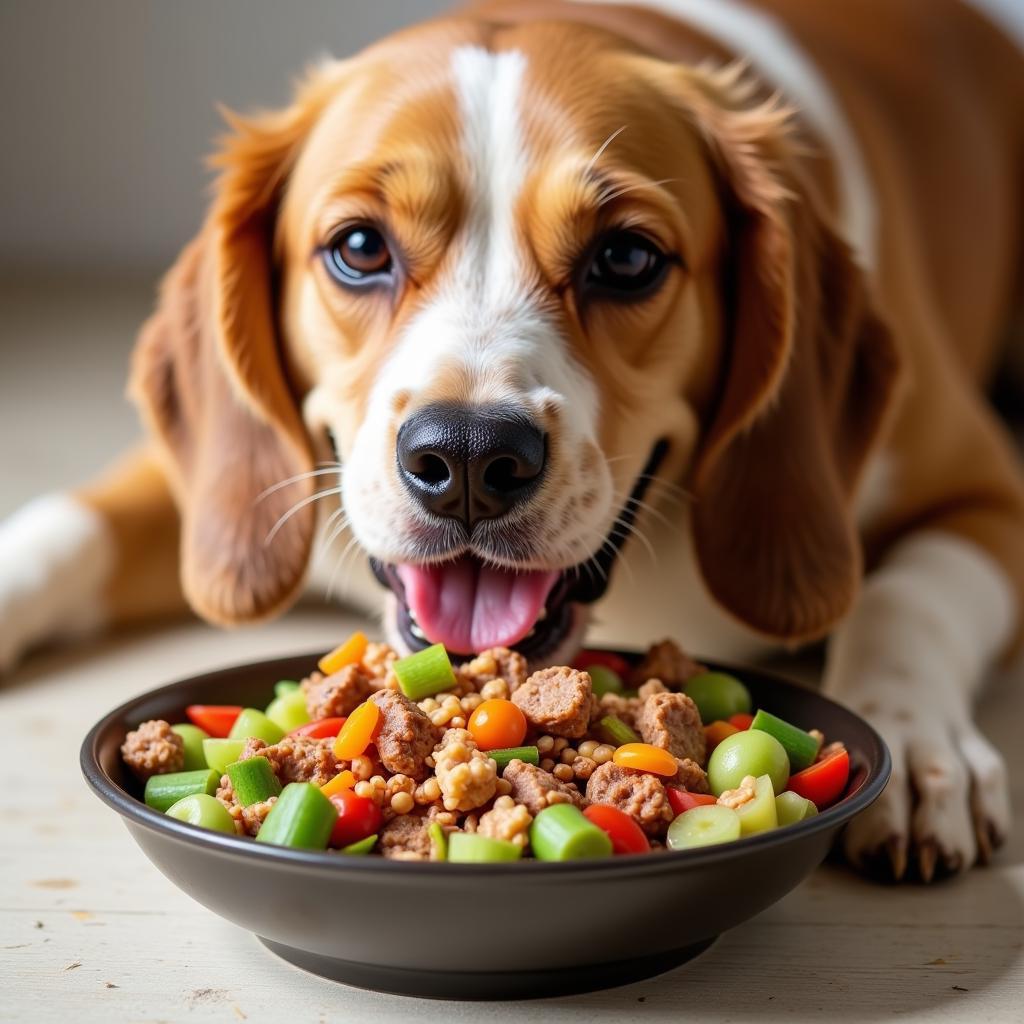Adding the right vitamins to your dog’s homemade food is crucial for their overall health and well-being. Ensuring a balanced diet with essential vitamins can prevent deficiencies and promote a long, happy life for your furry friend. So, let’s dive into the world of canine nutrition and discover which Vitamins To Add To Homemade Dog Food.
Understanding Your Dog’s Vitamin Needs
Just like humans, dogs require a variety of vitamins for optimal health. These vitamins play vital roles in numerous bodily functions, from supporting growth and development to boosting the immune system. While commercial dog foods are often fortified with vitamins, homemade diets require careful consideration to ensure your dog receives all the necessary nutrients. Failing to provide adequate vitamins can lead to serious health issues.
 Dog enjoying a bowl of nutritious homemade food
Dog enjoying a bowl of nutritious homemade food
Key Vitamins for Homemade Dog Food
Several key vitamins are essential for inclusion in homemade dog food. These include:
- Vitamin A: Supports vision, bone growth, and reproduction.
- B Vitamins: A complex of vitamins essential for energy production, nerve function, and red blood cell formation.
- Vitamin C: An antioxidant that supports the immune system. While dogs can produce some vitamin C, supplementation can be beneficial, especially for senior dogs or those with certain health conditions.
- Vitamin D: Crucial for calcium absorption and bone health.
- Vitamin E: Another powerful antioxidant that protects cells from damage.
Which Vitamins Should You Supplement?
While a balanced homemade diet can provide some vitamins, supplementation is often necessary. Determining the appropriate vitamin supplements depends on factors like your dog’s age, breed, and overall health. Consulting with a veterinarian or a veterinary nutritionist is highly recommended to create a customized vitamin plan for your dog. They can assess your dog’s individual needs and recommend the correct dosage of each vitamin. Over-supplementation can be just as harmful as deficiencies, so it’s essential to get professional guidance.
 Veterinarian performing a check-up on a healthy dog
Veterinarian performing a check-up on a healthy dog
Choosing the Right Supplements
Once you’ve determined which vitamins to supplement, choosing high-quality products from reputable brands is crucial. Look for supplements specifically formulated for dogs, and always follow the dosage instructions carefully. Various forms of supplements are available, including powders, tablets, and chews. Choose the form that best suits your dog’s preferences and makes administration easy. Remember, consistency is key when it comes to vitamin supplementation.
How to Add Vitamins to Homemade Dog Food
Adding vitamin supplements to your dog’s homemade food is generally straightforward. Powders can be mixed directly into the food, while tablets or chews can be given separately or crushed and mixed in. Ensure the vitamins are thoroughly incorporated to prevent uneven distribution. Store supplements in a cool, dry place to maintain their potency.
What Happens if My Dog Has a Vitamin Deficiency?
Vitamin deficiencies can manifest in various ways, depending on the specific vitamin lacking. Symptoms can range from mild to severe and may include skin problems, poor coat condition, lethargy, weakness, and even neurological issues. If you suspect your dog has a vitamin deficiency, consult your veterinarian immediately. They can perform blood tests to confirm the deficiency and recommend appropriate treatment. Early detection and intervention are crucial to prevent long-term health problems.
Beyond Vitamins: A Holistic Approach to Canine Nutrition
While vitamins are essential, they are just one piece of the puzzle. A balanced homemade diet should also include high-quality protein sources, healthy fats, carbohydrates, and minerals. Variety is key, so incorporate a range of ingredients to ensure your dog receives a wide spectrum of nutrients. Just like you might explore options like plant food for veggies for your own garden, consider the diverse nutritional needs of your canine companion. Perhaps you’re considering customized dog food or exploring the possibilities of bulk dried food. These options can offer convenience and ensure a balanced diet.
Remember, feeding your dog a homemade diet is a commitment to their long-term health and happiness. By providing them with a complete and balanced diet, including essential vitamins, you’re investing in their overall well-being and strengthening the bond you share.
Conclusion: Nourishing Your Canine Companion with the Right Vitamins
Providing the correct vitamins to add to homemade dog food is crucial for your dog’s health. Consult with a vet for personalized guidance, ensuring they receive the optimal balance for a long, vibrant life. Thinking about other pet needs? Explore options like the best toppers for cat food for your feline friend or consider whether can cats without teeth eat dry food.
FAQ
- What are the most important vitamins for dogs?
- Can I give my dog human vitamin supplements?
- How do I know if my dog has a vitamin deficiency?
- What are the signs of vitamin toxicity in dogs?
- How much of each vitamin should I add to my dog’s food?
- Are there any specific vitamins that are toxic to dogs?
- What are some good sources of vitamins for dogs?
Common Scenarios and Questions:
- Scenario: My dog is a picky eater. How can I ensure they get their vitamins? Solution: Try mixing the supplements with a small amount of highly palatable food, such as cooked chicken or plain yogurt.
- Question: Can I overdose my dog on vitamins? Answer: Yes, over-supplementation can be harmful. Always follow the recommended dosage and consult your veterinarian.
Further Exploration
For more information on pet nutrition and related topics, you might find these helpful:
- Articles on specific vitamin deficiencies in dogs
- Resources on creating balanced homemade dog food recipes
Need more help? Contact us at Phone: 02437655121, Email: minacones@gmail.com or visit us at 3PGH+8R9, ĐT70A, thôn Trung, Bắc Từ Liêm, Hà Nội, Việt Nam. We have a 24/7 customer service team.